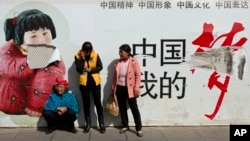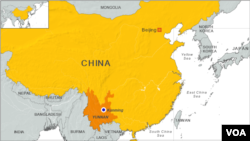BEIJING —
Chinese authorities say separatist terrorists carried out a violent and bloody attack at a train station late Saturday night in Kunming, the capital of southwest China's Yunnan Province. The attack left at least 33 dead and more than 130 injured.
According to eyewitness accounts posted online and in state-run media, more than 10 assailants dressed in black and carrying long fruit knives randomly slashed and hacked travelers in the station.
The carnage began inside, near the train station's ticket counters, and then spilled out onto the main square in front of the station. State media say four of the assailants were shot dead and one, a female, was taken into police custody. Others are still on the run.
Although authorities have given little detail so far, they say there is ample evidence that shows the attack was carried out by separatists from China's restive western Xinjiang region.
Calls to End 'Terrorism'
Chinese state media have dubbed the incident China's 9-11 a reference to the September 11 terrorist attacks in the United States in 2001. In an opinion piece, the state-run Xinhua news agency argued that terrorists should be punished with an iron fist and warned that nationwide outrage had been stirred.
The piece also noted that Chinese President Xi Jinping's recent decision to establish a state security committee was both timely and necessary. Very little is known about the new body, which is expected to focus on domestic security among other things.
President Xi has called on authorities to stop what he calls the rampant momentum of terrorists. The attack in Kunming is the second in less than six months that authorities say has been carried by separatists from Xinjiang.
Last October, authorities blamed Muslim Uighur separatists for driving a jeep onto the doorstep of the Forbidden City in Beijing. That incident, which authorities also called a terrorist attack, killed five people and injured dozens of others.
The attack in Kunming comes just as China's lawmakers and top political advisors begin holding annual meetings in Beijing. In response, some are calling on the government to launch a harsh nation-wide crackdown in response.
China's Xinhua news agency quotes Yin Zhuo, the head of an expert panel that consults for the Chinese navy as one of those in support of such a plan.
"The well-planned attack was not an issue of ethnics or religion, it was an issue of terrorism with links to the terrorist forces out of the country," Yin told Xinhua.
Beijing has long blamed much of Xinjiang's unrest on what it calls Uighur terrorists affiliated with the banned East Turkestan Islamic Movement. China says its members are trained in foreign countries.
Some analysts say that China exaggerates foreign involvement in the unrest and that government policies in Xinjiang and ethnic tensions are the source of the problem.
Chinese Take to Social Media to Comment on Attack
On social media sites reaction to the attack ranged from outrage to concern and sadness.
Many posted candle icons and wrote 'pray for Kunming' or expressed their solidarity with the city saying "we are all from Kunming." Kunming is popular with foreigners and is a cultural melting pot of China's rich variety of ethnic groups.
Some voiced concern that the bloody attacks would further stoke ethnic tensions between China's majority Han population and Muslim Uighurs in Xinjiang and urged others to not blame all Uighurs for the attack. Others said the attack would only heighten their distrust of the minority group.
In one posting, a Weibo user by the name of Chen Yingsong (陈应松) argued that the complaints Uighurs have are not with the Han ethnic group but are more of a struggle with a few of China's Han ruling elite. He noted that those who were forced from their homes when the Three Gorges Dam was built were no different. That post was later removed.
The government has not yet released any details about the ethnicity of the attackers, but the fact that were allegedly from Xinjiang raises the possibility that the government could blame separatist Muslim Uighurs for the attack as they have done in the past.
Well known Chinese journalist Luo Changping (罗昌平) posted a message online saying a fellow journalist friend who shared his feelings about the attack with him remarked that every time something like this happens, the Chinese government "never lets you know what happened."
"It only lets you blindly hate, live in fear and ignorance and die without ever understanding anything," the post said. The post was removed from Weibo along with other posts that raised questions about the attack.
According to eyewitness accounts posted online and in state-run media, more than 10 assailants dressed in black and carrying long fruit knives randomly slashed and hacked travelers in the station.
The carnage began inside, near the train station's ticket counters, and then spilled out onto the main square in front of the station. State media say four of the assailants were shot dead and one, a female, was taken into police custody. Others are still on the run.
Although authorities have given little detail so far, they say there is ample evidence that shows the attack was carried out by separatists from China's restive western Xinjiang region.
Calls to End 'Terrorism'
Chinese state media have dubbed the incident China's 9-11 a reference to the September 11 terrorist attacks in the United States in 2001. In an opinion piece, the state-run Xinhua news agency argued that terrorists should be punished with an iron fist and warned that nationwide outrage had been stirred.
The piece also noted that Chinese President Xi Jinping's recent decision to establish a state security committee was both timely and necessary. Very little is known about the new body, which is expected to focus on domestic security among other things.
President Xi has called on authorities to stop what he calls the rampant momentum of terrorists. The attack in Kunming is the second in less than six months that authorities say has been carried by separatists from Xinjiang.
Last October, authorities blamed Muslim Uighur separatists for driving a jeep onto the doorstep of the Forbidden City in Beijing. That incident, which authorities also called a terrorist attack, killed five people and injured dozens of others.
The attack in Kunming comes just as China's lawmakers and top political advisors begin holding annual meetings in Beijing. In response, some are calling on the government to launch a harsh nation-wide crackdown in response.
China's Xinhua news agency quotes Yin Zhuo, the head of an expert panel that consults for the Chinese navy as one of those in support of such a plan.
"The well-planned attack was not an issue of ethnics or religion, it was an issue of terrorism with links to the terrorist forces out of the country," Yin told Xinhua.
Beijing has long blamed much of Xinjiang's unrest on what it calls Uighur terrorists affiliated with the banned East Turkestan Islamic Movement. China says its members are trained in foreign countries.
Some analysts say that China exaggerates foreign involvement in the unrest and that government policies in Xinjiang and ethnic tensions are the source of the problem.
Chinese Take to Social Media to Comment on Attack
On social media sites reaction to the attack ranged from outrage to concern and sadness.
Many posted candle icons and wrote 'pray for Kunming' or expressed their solidarity with the city saying "we are all from Kunming." Kunming is popular with foreigners and is a cultural melting pot of China's rich variety of ethnic groups.
Some voiced concern that the bloody attacks would further stoke ethnic tensions between China's majority Han population and Muslim Uighurs in Xinjiang and urged others to not blame all Uighurs for the attack. Others said the attack would only heighten their distrust of the minority group.
In one posting, a Weibo user by the name of Chen Yingsong (陈应松) argued that the complaints Uighurs have are not with the Han ethnic group but are more of a struggle with a few of China's Han ruling elite. He noted that those who were forced from their homes when the Three Gorges Dam was built were no different. That post was later removed.
The government has not yet released any details about the ethnicity of the attackers, but the fact that were allegedly from Xinjiang raises the possibility that the government could blame separatist Muslim Uighurs for the attack as they have done in the past.
Well known Chinese journalist Luo Changping (罗昌平) posted a message online saying a fellow journalist friend who shared his feelings about the attack with him remarked that every time something like this happens, the Chinese government "never lets you know what happened."
"It only lets you blindly hate, live in fear and ignorance and die without ever understanding anything," the post said. The post was removed from Weibo along with other posts that raised questions about the attack.









